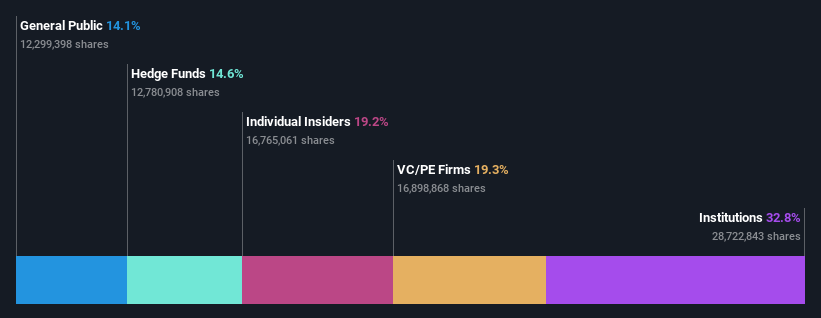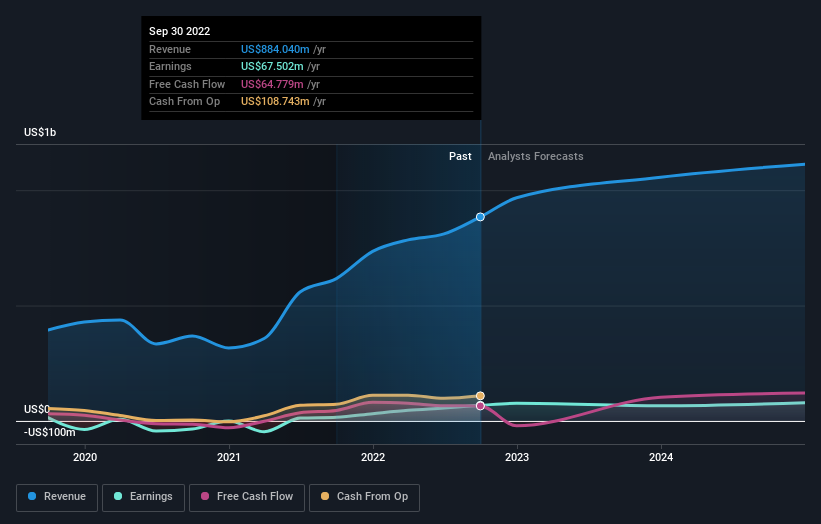- United States
- /
- Hospitality
- /
- NYSE:ACEL
Accel Entertainment, Inc. (NYSE:ACEL) institutional owners may be pleased with recent gains after 25% loss over the past year

Key Insights
- Significantly high institutional ownership implies Accel Entertainment's stock prices are sensitive to their trading actions.
- The top 6 shareholders own 54% of the company
- Insiders have been selling lately
Every investor in Accel Entertainment, Inc. (NYSE:ACEL) should be aware of the most powerful shareholder groups. We can see that institutions own the lion's share in the company with 33% ownership. Put another way, the group faces the maximum upside potential (or downside risk).
Institutional investors would appreciate the 6.6% increase in share prices last week, given their one-year returns have been disappointing at 25%.
Let's take a closer look to see what the different types of shareholders can tell us about Accel Entertainment.
Check out our latest analysis for Accel Entertainment

What Does The Institutional Ownership Tell Us About Accel Entertainment?
Many institutions measure their performance against an index that approximates the local market. So they usually pay more attention to companies that are included in major indices.
Accel Entertainment already has institutions on the share registry. Indeed, they own a respectable stake in the company. This can indicate that the company has a certain degree of credibility in the investment community. However, it is best to be wary of relying on the supposed validation that comes with institutional investors. They too, get it wrong sometimes. If multiple institutions change their view on a stock at the same time, you could see the share price drop fast. It's therefore worth looking at Accel Entertainment's earnings history below. Of course, the future is what really matters.

Our data indicates that hedge funds own 15% of Accel Entertainment. That worth noting, since hedge funds are often quite active investors, who may try to influence management. Many want to see value creation (and a higher share price) in the short term or medium term. Looking at our data, we can see that the largest shareholder is Clairvest Group Inc. with 19% of shares outstanding. Meanwhile, the second and third largest shareholders, hold 9.9% and 8.5%, of the shares outstanding, respectively. Andrew Rubenstein, who is the second-largest shareholder, also happens to hold the title of Chief Executive Officer.
We did some more digging and found that 6 of the top shareholders account for roughly 54% of the register, implying that along with larger shareholders, there are a few smaller shareholders, thereby balancing out each others interests somewhat.
While it makes sense to study institutional ownership data for a company, it also makes sense to study analyst sentiments to know which way the wind is blowing. There are plenty of analysts covering the stock, so it might be worth seeing what they are forecasting, too.
Insider Ownership Of Accel Entertainment
While the precise definition of an insider can be subjective, almost everyone considers board members to be insiders. Company management run the business, but the CEO will answer to the board, even if he or she is a member of it.
I generally consider insider ownership to be a good thing. However, on some occasions it makes it more difficult for other shareholders to hold the board accountable for decisions.
Our most recent data indicates that insiders own a reasonable proportion of Accel Entertainment, Inc.. It has a market capitalization of just US$836m, and insiders have US$160m worth of shares in their own names. We would say this shows alignment with shareholders, but it is worth noting that the company is still quite small; some insiders may have founded the business. You can click here to see if those insiders have been buying or selling.
General Public Ownership
With a 14% ownership, the general public, mostly comprising of individual investors, have some degree of sway over Accel Entertainment. While this size of ownership may not be enough to sway a policy decision in their favour, they can still make a collective impact on company policies.
Private Equity Ownership
With a stake of 19%, private equity firms could influence the Accel Entertainment board. Sometimes we see private equity stick around for the long term, but generally speaking they have a shorter investment horizon and -- as the name suggests -- don't invest in public companies much. After some time they may look to sell and redeploy capital elsewhere.
Next Steps:
It's always worth thinking about the different groups who own shares in a company. But to understand Accel Entertainment better, we need to consider many other factors. Consider risks, for instance. Every company has them, and we've spotted 2 warning signs for Accel Entertainment you should know about.
Ultimately the future is most important. You can access this free report on analyst forecasts for the company.
NB: Figures in this article are calculated using data from the last twelve months, which refer to the 12-month period ending on the last date of the month the financial statement is dated. This may not be consistent with full year annual report figures.
New: Manage All Your Stock Portfolios in One Place
We've created the ultimate portfolio companion for stock investors, and it's free.
• Connect an unlimited number of Portfolios and see your total in one currency
• Be alerted to new Warning Signs or Risks via email or mobile
• Track the Fair Value of your stocks
Have feedback on this article? Concerned about the content? Get in touch with us directly. Alternatively, email editorial-team (at) simplywallst.com.
This article by Simply Wall St is general in nature. We provide commentary based on historical data and analyst forecasts only using an unbiased methodology and our articles are not intended to be financial advice. It does not constitute a recommendation to buy or sell any stock, and does not take account of your objectives, or your financial situation. We aim to bring you long-term focused analysis driven by fundamental data. Note that our analysis may not factor in the latest price-sensitive company announcements or qualitative material. Simply Wall St has no position in any stocks mentioned.
About NYSE:ACEL
Accel Entertainment
Operates as a distributed gaming and local entertainment operator in the United States.
Reasonable growth potential with mediocre balance sheet.
Similar Companies
Market Insights
Community Narratives



